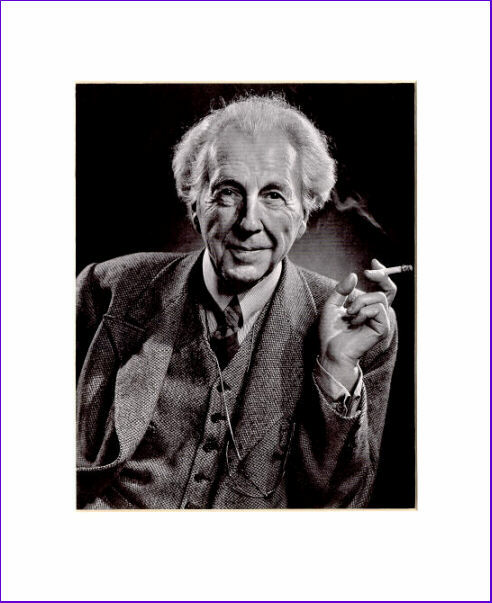
 The other day I went to the Frank Lloyd Wright exhibit at the Guggenheim here in New York. Wright is famous for such great works as Falling Water, Beth Shalom Synagogue in Elkins Park PA, and his unrealized plan for Greater Baghdad. He was truly ahead of his time and is widely heralded as one of the greatest American architects who has ever lived. I was intrigued to discover that the philosophy behind Wright’s work was, “architecture should be done from within outward.” The same is true with good Christian Theology.
The other day I went to the Frank Lloyd Wright exhibit at the Guggenheim here in New York. Wright is famous for such great works as Falling Water, Beth Shalom Synagogue in Elkins Park PA, and his unrealized plan for Greater Baghdad. He was truly ahead of his time and is widely heralded as one of the greatest American architects who has ever lived. I was intrigued to discover that the philosophy behind Wright’s work was, “architecture should be done from within outward.” The same is true with good Christian Theology.
Unfortunately, like every other religion, bad Christian theology is chiefly concerned with ethics and behavior modification, or “from outward within.” Romans 12:1-2 is one of the places that bad Christian theologians tend to focus on the “from outward within”:
Therefore, I urge you, brothers, in view of God’s mercy, to offer your bodies as living sacrifices, holy and pleasing to God—this is your spiritual act of worship. Do not conform any longer to the pattern of this world, but be transformed by the renewing of your mind. Then you will be able to test and approve what God’s will is—his good, pleasing and perfect will.
Popular pastors across America, emphasizing this passage—especially the living sacrifice part–are calling for a new reformation focused on “deeds not creeds.” While I am sympathetic with the goals of these pastors—to get people to express their love in action—I think that they are missing the crucial part: the Cross. Many of these theologians seem to ignore the fact that before Romans 12 comes eleven other chapters in which Paul has just articulated the idea that the sacrifice of our lives has already occurred through the death and resurrection of Christ, and that instead of viewing Christianity as simply another way of ordering our outward lives to effect change in our inward selves, the new life we have is one we live “In Christ,” where we are completely justified by the person and work of Jesus Christ: “from within outward.”
 Therefore, when Romans 12 is seen as not isolated from the rest of the epistle one can see the emphasis is “from within outward.” The entire chapter begins with the statement: in view of God’s mercies. Like St. Augustine once said, “God demands of us what we cannot do so that we might know what to seek from Him,” and this is exactly what the Apostle Paul has been doing throughout the previous eleven chapters. He clearly demonstrates that what we need is a righteousness apart from ourselves—Jesus Christ— and that his one act of righteousness leads to justification and freedom for all people. Therefore operating “from within outward” in view of God’s mercies becomes a liberating idea that frees us from the notion that as living sacrifices we are somehow atoning sacrifices and need to get our acts together in order for God to be pleased with us. The atonement—the payment for sin—has been done; it is finished. Our lives as “living sacrifices” are to be ones of peace, hope and love flowing from the promise of 1 John: “If anyone sins they have an advocate with Father, Jesus Christ the Righteous.”
Therefore, when Romans 12 is seen as not isolated from the rest of the epistle one can see the emphasis is “from within outward.” The entire chapter begins with the statement: in view of God’s mercies. Like St. Augustine once said, “God demands of us what we cannot do so that we might know what to seek from Him,” and this is exactly what the Apostle Paul has been doing throughout the previous eleven chapters. He clearly demonstrates that what we need is a righteousness apart from ourselves—Jesus Christ— and that his one act of righteousness leads to justification and freedom for all people. Therefore operating “from within outward” in view of God’s mercies becomes a liberating idea that frees us from the notion that as living sacrifices we are somehow atoning sacrifices and need to get our acts together in order for God to be pleased with us. The atonement—the payment for sin—has been done; it is finished. Our lives as “living sacrifices” are to be ones of peace, hope and love flowing from the promise of 1 John: “If anyone sins they have an advocate with Father, Jesus Christ the Righteous.”

COMMENTS
5 responses to “Frank Lloyd Wright and Romans 12:1-2”
Leave a Reply













Helpful Jake, thanks!
haha. . no problem Jake. . I think theological regularity is very important:)
Awesome post Jacob. Vintage M’Bird! That’s why I pay my membership dues. 🙂
Good Ananlogy with Wright. To paraphrase my favorite teacher/preacher in the greater Dallas/Ft. Worth area: You don’t offer your body as a living sacrifice so that God will love you – God loves you so your greatest desire is to offer your body as a living sacrifice. The former is religon; the latter the gospel.
The renewing of the mind, is simply hearing again and again
“Your sin is forgiven for Christ’s sake.”
“You belong to the Great Shepherd, who will never let you go.”